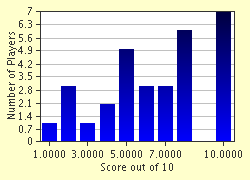Quiz Answer Key and Fun Facts
1. The first mention of black in the NKJV Bible is Leviticus 13:31, a verse stating in part if there is no black hair in a scaly sore, the priest shall isolate the one who has the scale for seven days. Who is traditionally credited with writing Leviticus?
2. 1 Kings 18:45 tells of a king of Israel seeing the sky becoming black with clouds and wind and heavy rain. Who was the king?
3. What king had a royal court in his garden boasting, among other things, black marble?
4. Proverbs 7:9 tells of a man taking the path to the house of a harlot "in the black and dark night." Who is credited with writing most of the book of Proverbs?
5. "My skin grows black and falls from me; my bones burn with me," is a quote from an Old Testament book. Who made the statement?
6. The following verse is from an Old Testament book: "His head is like the finest gold; his locks are wavy and black as a raven." What is the name of the book?
7. What prophet of God made reference to a farmer sowing black cummin? (The NIV does not use the adjective black when referring to cummin.)
8. The following statement is from an Old Testament book: "For this shall the earth mourn, and the heavens above be black, because I have spoken." What is the name of the book?
9. Who had a vision of four chariots, with the second chariot being pulled by black horses?
10. In what book of the Bible do you read, "the sun became black as sackcloth of hair, and the moon became like blood."
Source: Author
Cowrofl
This quiz was reviewed by FunTrivia editor
looney_tunes before going online.
Any errors found in FunTrivia content are routinely corrected through our feedback system.

